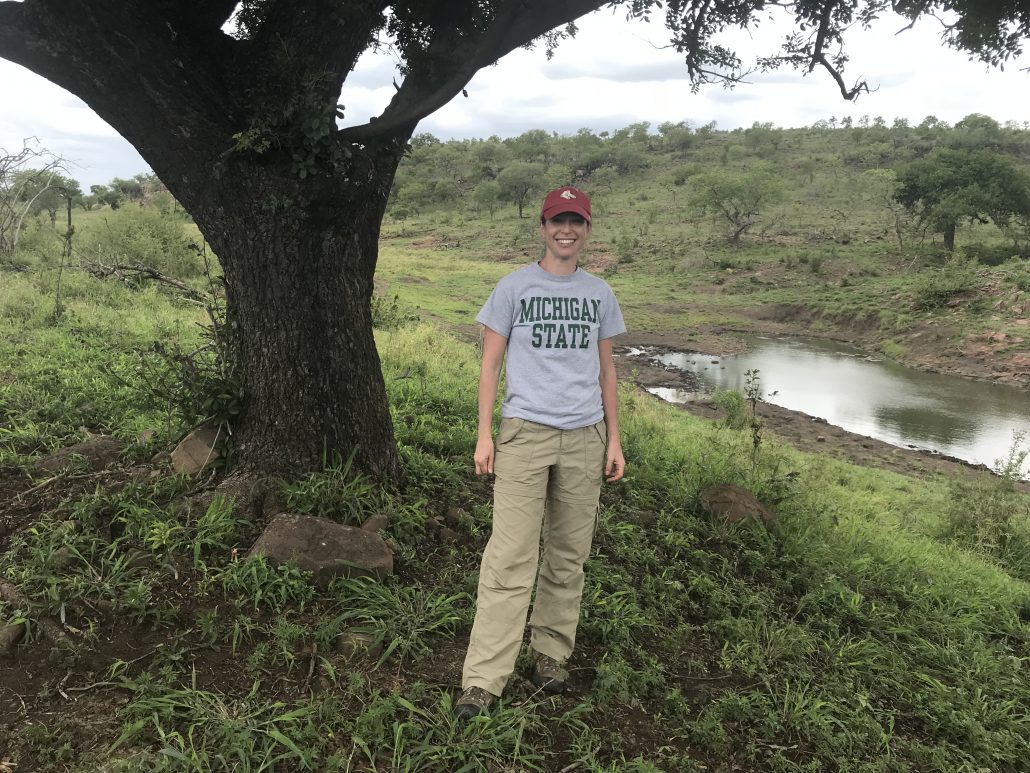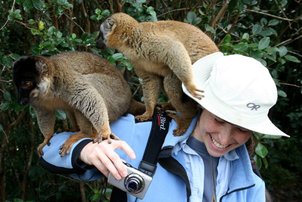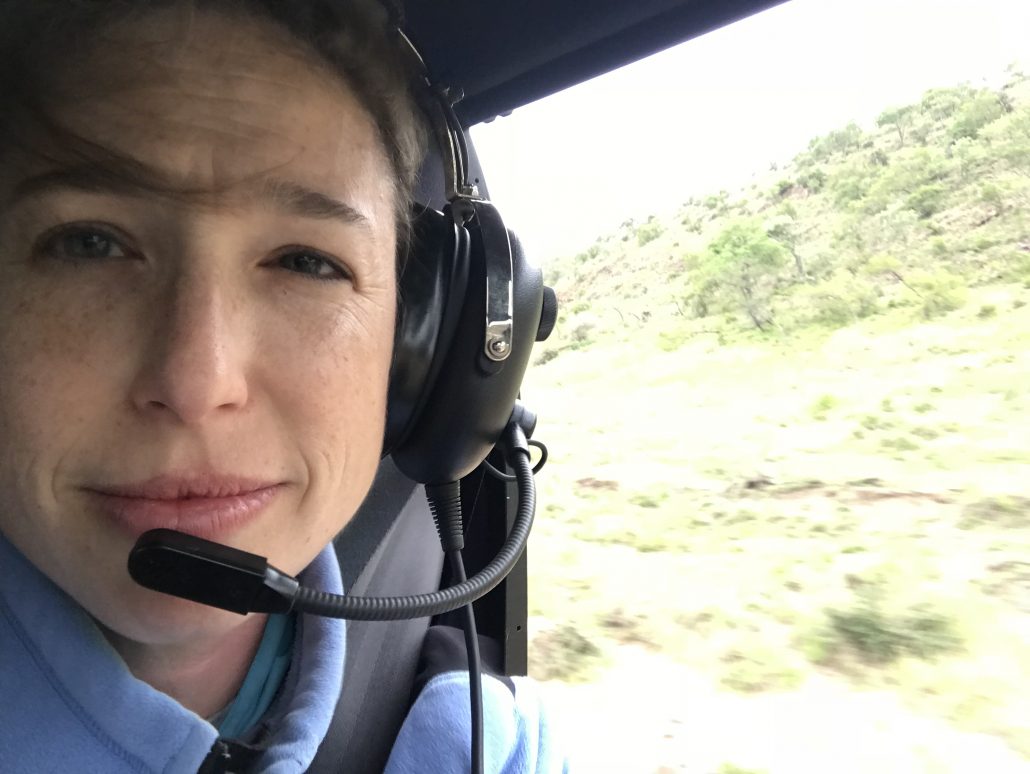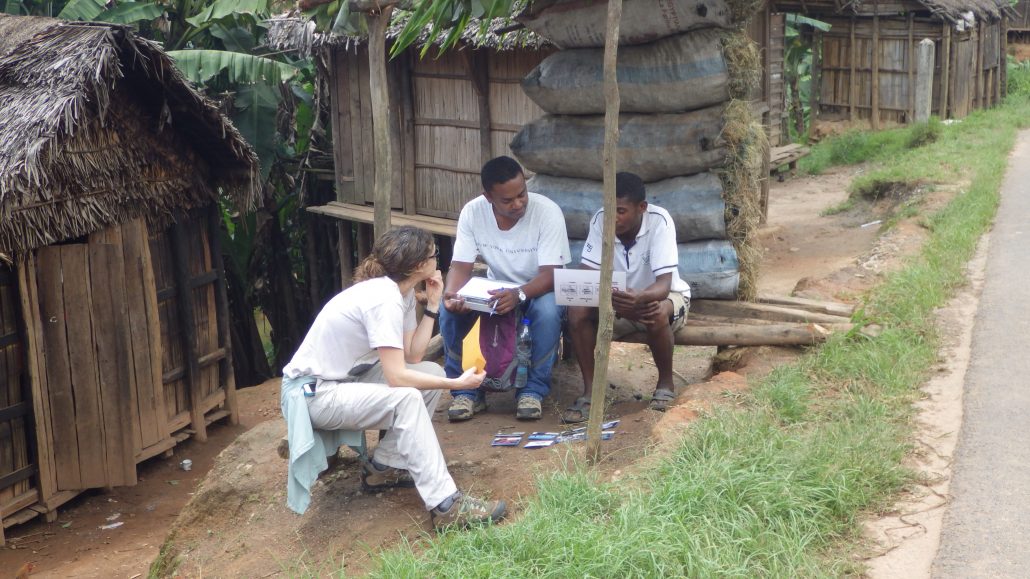
Meredith Gore is an interdisciplinary and applied social scientist working to explore the relationships between human behavior and the environment, as well as the immediate Past President of SCB’s Social Science Working Group.
SCB held a Q&A with Meredith to learn about her passion for conservation, the growing field of social science, and what it’s like to be in a leadership role at SCB.
Tell us a bit about yourself.
Professionally, I have a PhD in Natural Resource Policy & Management from Cornell University, a MS in Environment and Resource Policy from George Washington University and a BA in Anthropology and Environmental Studies from Brandies University. I served as a 2016-2017 National Academies of Sciences Jefferson Science Fellow at the US Department of State and am currently enrolled in a Women and Leadership Certificate Program through eCornell. I am currently an Associate Professor in the Department of Fisheries and Wildlife at Michigan State University. Until last fall, I was jointly appointed in FW and the School of Criminal Justice.
Personally, I have two young daughters who love to swim and listen to music. My husband is a data scientist for a FinTech start up. I have a Siberian husky, Vega, who likes to come to work with me. I grew up in central Massachusetts.
When did you know that you wanted to work in conservation and what fuels your passion for working as a conservation social scientist?
My mother was a teacher and my father a physician; I grew up in a household of very curious caretakers. During my second year of graduate school, I became increasingly frustrated that conservation policy alternatives were being evaluated using a certain set of criteria when the scientific publications I read suggested alternative evidence-based metrics. More frustrating still was why was a conservation policy alternative being drafted based on the ecological knowledge base and not the social science knowledge base? The question that perturbed me the most though, was why isn’t conservation social science working to answer these policy questions in a systematic, reliable, and valid way? Asking these questions resulted in the obvious conclusion (for me). I could work to help better translate conservation social science into science policy. I could listen to policy makers’ questions about evaluation, assessment, and feasibility estimates and better advance the scientific knowledge base needed to answer the questions. I could be an applied conservation social scientist working to improve the efficacy of policy. So, I embarked on my PhD.
Two things fuel my passion. The first is collaboration with other conservation scientists. The second is that the more I learn about human relationships with the environment, the more work I believe needs to be done to improve those relationships.
How did you end up where you are now? Was your career path clear, or did unforeseen opportunities come about at the right times?
I guess my path has been a little bit of both. I wanted to go into academia but I never thought I would have a joint appointment or do work in conservation criminology. I’ve been blessed to be at a place like MSU, which allows me the fullest creative space possible to pursue my science. I have been surrounded by administrators and supervisors who promote exploration. This may sound perverse, but I have had the good fortune to fail many (many) times in my professional life and it now enables me to take calculated risks and put myself outside my comfort zone. I love operating on the scientific boundary and am comfortable with being uncomfortable.
What are you currently working on (professionally)?
I have a number of conservation criminology projects (e.g., wildlife guardianship in Vietnam, vulture trafficking in Southern Africa, non-compliance with inland fisheries rules in Brazil, wild meat trafficking in Democratic Republic of Congo) in collaboration with members of my lab and conservation partners. I am also working with the Office of the Geographer and Global Issues at the State Department on leveraging geospatially enabled information (including human geography) to help combat wildlife trafficking in Africa.

What does a typical work day look like for you?
I have three work shifts during the work week. Early morning is my writing and creative time. Break for kids. Mid-day is for teaching, meetings, and administration. Break for kids. Evening is for emails, catch up, planning. When I’m in the field I try and go 24/7.
You are a conservation social scientist, tell us more about your job, and what being a conservation social scientist means.
In my opinion, conservation social science is a policy-relevant and applied science. It is the human dimension of conservation biology. Sometimes it is interdisciplinary but it is always beholden to scientific standards of reliability and validity. Dan Miller once referred to conservation social science as a “big tent” science, and in a lot of ways, that is true.
As an academic, I teach courses on human dimensions of conservation biology, where I work with students on comparative epistemologies, qualitative versus quantitative inquiry and methods, diffusing results and communicating science. A common thread through all of my research is that it works to build understanding about the human dimensions of conservation so as to improve the effectiveness and efficiency of decision making.
Most of my work is global in nature, and so my research and teaching scholarship incorporates the cross cultural dimensions of theory, methods, and analysis.
You codeveloped the Conservation Criminology Teaching Certificate at Michigan State University, tell us about that process and what the certificate entails.
The certificate involves three graduate-level courses touching on three conceptual and disciplinary spaces: risk and decision making, corporate environmental crime, and global risks. The courses are designed for adult learners from any discipline and any background. We developed the courses based on a number of real world case studies, such as e-waste and wildlife trafficking, and structured the certificate according to the principles of coupled human-natural systems. At first, there were no textbooks for Conservation Criminology and so I think that made learning a bit more challenging for students, but in May, I published the first edited volume on the topic. The certificate was and is, I believe, the only one in the world. So, we don’t have a lot to compare ourselves to in order to evolve. We work hard to get feedback from students so as to improve the course content and delivery.
Do you have any advice for scientists looking to get into the social science of conservation biology, whether they are early in their careers or looking to make a career move?
There are a lot of academic programs that offer degrees in conservation social science, so that is a helpful enabling factor. Many conservation organizations and agencies have dedicated conservation social science positions as well (a good thing!). I think that building expertise as well as experience is very helpful (read the literature!). I’m a strong believer in hand-on learning as well. Internships, externships, shadowing, informational interviews, formal or informal mentoring etc. really helped me in building my capacity.
If you live in place where these types of capacity building activities are not that accessible, I might recommend trying to get a group of like-minded people together and working with your local SCB chapter or section to tap into SSWG expertise. There are online resources as well from universities, federal agencies, nongovernmental organizations, and parastatals that can help provide entry into the field.

What do you like to do in your free time?
I love to travel to new places, particularly with my kids and friends. I also love to go for walks with my dog. I like to do yoga, play tennis, and run as well.
What did it mean to you to be president of the Social Science Working Group?
It was a huge honor and responsibility to be able to follow in the footsteps of Past Presidents Mike Mascia and Tara Teel; they’re amazing and world-renowned conservation social scientists. SSWG did so much to help me develop personally and professionally, and so I also viewed the opportunity to give back to the WG to be unique and important. One observation that my SSWG cohort discussed often was that we bared witness to the mainstreaming of social science within SCB; there is still much to be done but social science is clearly recognized as being an integral and essential part of SCB and being part of SSWG during this transition time was pretty amazing! And now that I am Past-President I am really excited to see what the next leadership board puts out there. They have so many great ideas and the capacity to realize them!
What did you learn about leadership during your time as president of the Social Science Working Group?
Oh this is a good one. And, I’m pretty sure I’m not done learning yet! For sure I learned about planning: designing objectives, strategies, and procedures for accomplishing goals and coordinating with other parts of the organization in the most efficient manner. I also learned about networking (developing and maintaining relationships with others who may provide information or support resources) and inspiring others (motivating others towards greater enthusiasm for, and commitment to, work by appealing to emotion, values, logic, and personal example).
How did getting involved in a professional society like SCB benefit your career?
Network, network, network. J The opportunity to watch and learn from the world’s experts. The ability to see myself in my peers and the society’s leadership. Don’t get me wrong, we have lots of room for growth in the diversity department. But I’ve always said that SCB was the one professional society where people didn’t fall off their chair when I said I was a social scientist.
What was your favorite thing about being president of SCB’s Social Science Working Group?
I LOVED working with the other members of the SSWG board and members! I had no idea I would be able to cultivate such amazing personal and professional relationships. I learned so much from everyone on the board and membership and feel really empowered to have these relationships on hand now!
